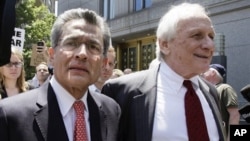NEW YORK -- A former director of the Goldman Sachs investment bank, Rajat Gupta, was found guilty Friday of insider trading by a jury in New York.
After deliberating for two days, the federal jury of eight women and four men found Gupta guilty on three charges of stock fraud and one charge of conspiring to conduct stock fraud. The jury found Gupta not guilty on two stock fraud charges. Sentencing of Gupta is scheduled for October 18. He could face up to 25 years in prison.
During the three-week trial, prosecutors said Gupta learned during a Goldman Sachs board meeting that investor Warren Buffett was going to invest $5 billion in the company. According to prosecutors, Gupta gave that information to his friend and investment partner, Raj Rajaratnam, who bought thousands of shares in Goldman Sachs. When news of the Buffett deal reached the public the next day, Rajaratnam sold the stocks, earning a $1 million profit. Insider trading - selling and buying stock based on information not available to the public - violates U.S. law
During the trial, Gupta’s defense attorney argued that the evidence against Gupta was circumstantial, not direct, and was based on what he called guesswork and speculation. The government case included e-mails, recorded telephone conversations and trading logs.
U.S. Attorney Preet Bharara, who has spearheaded a series of stock fraud prosecutions, said the government will continue to pursue those who violate securities laws, regardless of status, wealth or influence. In a written statement, the prosecutor said Gupta has now exchanged the lofty board room for the prospect of a lowly jail cell.
Raj Rajaratnam, a hedge fund manager, was convicted of stock fraud in a separate trial last year and is now serving an 11-year prison term. Attorney Richard Holwell, now in private practice, was the federal judge who presided over Rajaratnam’s trial. He says the conviction of Gupta is a great success for prosecutors in terms of their continued attack against what Holwell calls Wall Street business ethics.
“It’s not a surprising result, actually," he said. "The prosecutor did a great job, of course. But these cases generally turn on circumstantial evidence, on timelines and trading reports. The Rajaratnam case was a little unusual in that respect because of the wiretaps. But if you look back over time, you’ll see conviction after conviction based on facts very similar to the ones that you saw in the Gupta case.”
Gupta, 63, made no statement when he heard the jury’s verdict. His attorney, Gary Naftalis, indicated Gupta will probably appeal the verdict. Naftalis said he believes the facts of this demonstrate that Mr. Gupta is innocent and, he went on, we continue to believe he is innocent of all charges. The lawyer called the trial only round one of this matter.
After deliberating for two days, the federal jury of eight women and four men found Gupta guilty on three charges of stock fraud and one charge of conspiring to conduct stock fraud. The jury found Gupta not guilty on two stock fraud charges. Sentencing of Gupta is scheduled for October 18. He could face up to 25 years in prison.
During the three-week trial, prosecutors said Gupta learned during a Goldman Sachs board meeting that investor Warren Buffett was going to invest $5 billion in the company. According to prosecutors, Gupta gave that information to his friend and investment partner, Raj Rajaratnam, who bought thousands of shares in Goldman Sachs. When news of the Buffett deal reached the public the next day, Rajaratnam sold the stocks, earning a $1 million profit. Insider trading - selling and buying stock based on information not available to the public - violates U.S. law
During the trial, Gupta’s defense attorney argued that the evidence against Gupta was circumstantial, not direct, and was based on what he called guesswork and speculation. The government case included e-mails, recorded telephone conversations and trading logs.
U.S. Attorney Preet Bharara, who has spearheaded a series of stock fraud prosecutions, said the government will continue to pursue those who violate securities laws, regardless of status, wealth or influence. In a written statement, the prosecutor said Gupta has now exchanged the lofty board room for the prospect of a lowly jail cell.
Raj Rajaratnam, a hedge fund manager, was convicted of stock fraud in a separate trial last year and is now serving an 11-year prison term. Attorney Richard Holwell, now in private practice, was the federal judge who presided over Rajaratnam’s trial. He says the conviction of Gupta is a great success for prosecutors in terms of their continued attack against what Holwell calls Wall Street business ethics.
“It’s not a surprising result, actually," he said. "The prosecutor did a great job, of course. But these cases generally turn on circumstantial evidence, on timelines and trading reports. The Rajaratnam case was a little unusual in that respect because of the wiretaps. But if you look back over time, you’ll see conviction after conviction based on facts very similar to the ones that you saw in the Gupta case.”
Gupta, 63, made no statement when he heard the jury’s verdict. His attorney, Gary Naftalis, indicated Gupta will probably appeal the verdict. Naftalis said he believes the facts of this demonstrate that Mr. Gupta is innocent and, he went on, we continue to believe he is innocent of all charges. The lawyer called the trial only round one of this matter.




